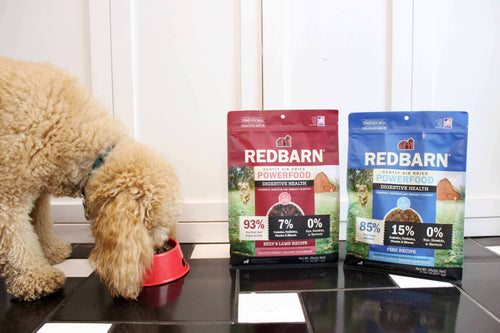
The Benefits of Vitamin E for Dogs and Cats
Share
Our bodies take care of us, but how well do we take care of our bodies?
Every day, our body produces skin, muscle, and bone.
Thanks to the many important roles of nutrients and nutrient consumption, our bodies can heal wounds, convert food into energy, and repair cellular damage. Nutrients are necessary to help regulate our body’s functions and keep us at a happy and healthy homeostasis.
We can get nutrients, including vital vitamins and minerals, from the food we eat, but because of our busy and demanding schedules, we don’t always incorporate enough fruits and vegetables into our diets. When this happens, we miss out on essential nutrients that can lower our risk of health issues like heart disease, stroke, cancer, and other conditions caused by poor diets and free radicals.
Did you know? According to the Center for Disease Control, 87% of adults don’t eat enough veggies!
That’s why it’s common for people to take a multivitamin or try to increase specific vitamin intake through their diets.
Vitamin E plays the role of an antioxidant, preventing free radicals from damaging fat in the body that are crucial for healthy bodies.
Many people get enough Vitamin E through the foods they eat. But if you live in the city, for example, you’re typically exposed to more free radicals due to environmental risk factors like cigarette smoke, air pollution, and ultraviolet rays that can occur from too much sun exposure. Consuming the right amount of Vitamin E and Vitamin E rich foods can prevent damage caused by free radicals.
But what about our furry family members?
Take a moment to look at your current pet food label.
You’ll likely notice a form of Vitamin E! But why?
We’re breaking down the benefits of Vitamin E for dogs and cats and the best ways to incorporate Vitamin E into their diets.
What is Vitamin E?
Vitamin E is a fat-soluble nutrient that is essential for your pet’s body to develop strong and healthy muscles, and healthy circulatory and immune systems. It’s also an antioxidant, helping to protect cells from damage caused by free radicals.
Vitamin E functions as a quenching agent for free radical molecules with single, highly reactive electrons in its outer shell.
Technically speaking, Vitamin E exists in four naturally occurring forms and refers to compound groups called tocopherols and tocotrienols. Two of the most common forms of Vitamin E are γ-tocopherol, found in soybean and corn oil, and α-tocopherol, found in olive and sunflower oils.
To really get into the nitty-gritty— Vitamin E protects Polyunsaturated Fatty Acids (PUFA’s), Vitamin A and sulfur-containing Amino Acids from oxidation… which we will get into a little later.
The more PUFAs in the diet, the more Vitamin E is necessary to protect pets from oxidation increases.
Did you know? Vitamin E is a fantastic functional ingredient for dogs AND cats?
Is Vitamin E Good for Dogs?
According to Lindsay Tracy, Director of New Business and Product Development at Redbarn Pet Products, “Free radicals are a group of atoms containing oxygen and free electrons that can damage cell membranes, proteins, DNA, and other essential parts of your pet’s body. Although free radicals are naturally produced by the metabolic process within the body, they can be overproduced when your pet is exposed to toxins, becomes ill, or is simply aging naturally.”
Studies have shown that free radicals can even cause cellular damage that can be a contributing factor to heart disease.
Although Vitamin E deficiency is rare in dogs, when a deficiency is developing you may notice poor vision, neurologic abnormalities, reproductive dysfunction, and an impaired immune system.
Is Vitamin E Good for Cats?
Just like dogs, Vitamin E is essential for your cat’s optimal health. Vitamin E can provide great benefits to your cat’s skin and can be used to treat mites, eczema, and flea allergy dermatitis.
In addition to those external benefits, Vitamin E protects cells from oxidative damage that can harm cell membranes, damage cardiovascular health, impair vision, and damage neurological function and fertility.
“Due to the nature of the diets typically consumed by cats, they are more susceptible than dogs to Vitamin E deficiency. Cats fed all fish diets, which are naturally low in Vitamin E, can develop a syndrome called ‘Yellow Fat Disease’ because Vitamin E is essential for normal fat metabolism,” Lindsay states.
The Animal Feed Labeling Guide produced by The Association of American Feed Control Officials (AAFCO) recommends adult cat food provides 30 International Units (IUs) of Vitamin E per kilogram of food.
Growing animals, like kittens, will require more Vitamin E. This is also true for lactating and pregnant animals. Other factors, like exercise, can also affect a cat’s Vitamin E needs.
“While Vitamin E supplements are something to be considered, depending upon your cat’s health and lifestyle, they should not be considered as a substitute for a complete and balanced diet containing all of the nutrients needed to thrive. Vitamin E is important to cats as they are carnivores, and plants are a much better source of Vitamin E compared to meats,” Lindsay says. “Check with your veterinarian for the best way to feed Vitamin E to your cat.”
Top 3 Ways to Give Your Cat or Dog Vitamin E
1. Orally, as a dietary supplement
2. In oils and shampoos
3. In their daily diet, i.e. In the ingredient list of quality canned, semi-moist, and dry foods.
Synthetic Vitamin E oil will start with the letters di; i.e. di-alpha-to. You can tell that oil is non-synthetic, or all-natural if it starts with the letter d, i.e. d-alpha-to.
How Do I Give My Dog Vitamin E?
Many quality pet foods, like Redbarn's Rolled Food, have Vitamin E, so there’s no need to include a Vitamin E supplement in your pet’s diet.
However, if your dog is suffering from dry or itchy skin, they may benefit from a Vitamin E boost. If skin problems are localized, Vitamin E can be applied topically. If your dog likes the bathtub, try adding Vitamin E oil to the water in the tub.
Giving your pet a Vitamin E pill will also work wonders for dry and oily skin! Try hiding it in a pill concealer like Redbarn’s Rolled Food.
But, what is the right Vitamin E dosage for dogs? Your best bet is to consult with your vet to get a personalized answer based on your dog’s size, diet, and individual needs. If this is your first time treating your pet with Vitamin E, you should speak to your trusted veterinarian to find out the best way to feed it to your pets.
Vitamin E is high in protein sources like eggs. You can also find it naturally in vegetables and nuts like dandelion, spinach, peanuts, and sunflower seeds.
How Do I Give My Cat Vitamin E?
For skin and coat health, Vitamin E oil can be applied topically to your cat. For cases like eczema, where your pet can become incredibly itchy, Vitamin E can ease discomfort by easing inflammation caused by scratching. However, Vitamin E alone won’t be enough to kill mites.
Always consult with your vet about proper treatment and pet care.
Vitamin E is a common additive in quality cat foods because it is essential for optimal health. For natural food sources of Vitamin E, include protein sources high in Vitamin E, like eggs (just make sure the eggs are fully cooked as raw eggs are not safe for cat consumption).
Another option is to give a small amount of Vitamin E oil directly to your cat, having them lick it off your finger or a spoon.
According to AAFCO, NRC or CVMA guidelines, the allowance for an adult cat is 1 to 3 IU per day.
Top 8 Dog and Cat Food Ingredients Naturally High in Vitamin E:
1. Eggs
2. Salmon
3. Peanut Butter
4. Spinach
5. Safflower Oil
6. Sunflower Oil
7. Soybean Oil
Top 6 Benefits of Vitamin E for Cats and Dogs
According to a report by DSM Bright Science Research in Animal Nutrition and Health, here are the top 6 benefits of Vitamin E for dogs.
1. Shiny Coat
- Vitamin E supports healthy skin and coats. If you turn your dog’s shampoo around, you may notice Vitamin E on the ingredient list, to help reduce flakiness and promote a healthy, glossy coat.
-
2. Improved Immune System
- Cold weather can dry out the skin and compromise the immune system. Both of those ailments are combated with Vitamin E for dogs.
3. Increased Fertility
- According to a study performed by Researchgate, Vitamin E supplementation for 60 days or more can improve the quality of semen in dogs with lowered fertility.
4. Improved Eyesight
- A famous researcher named Dr. Wilfrid Shute treated a champion Doberman Pinscher who became infertile and went blind with cataracts at age seven. After a few weeks of taking 300 IUs of Vitamin E daily, the dog sired several litters of puppies and, within three months, his cataracts cleared up!
5. Improved Muscular Function
- Certain deficiency signs of Vitamin E, like muscular dystrophy, can be prevented by Vitamin E supplementation along with other antioxidants and nutrients recommended by your veterinarian.
6. Improved Cardiovascular Health
- According to a study performed by researchers in the Department of Clinical Sciences at Cummings School of Veterinary Medicine and the Waltham Centre for Pet Nutrition on the Effects of Dietary Modification in Dogs with Early Chronic Valvular Disease, “When animals are given Vitamin E from a young age, the progression of age-related issues like cataracts, cancer, cardiovascular disease, and decreased immune function are slowed down. Dogs with dilated cardiomyopathy have increased oxidative stress compared to normal dogs, and Vitamin E concentrations decrease as the disease progresses.”



